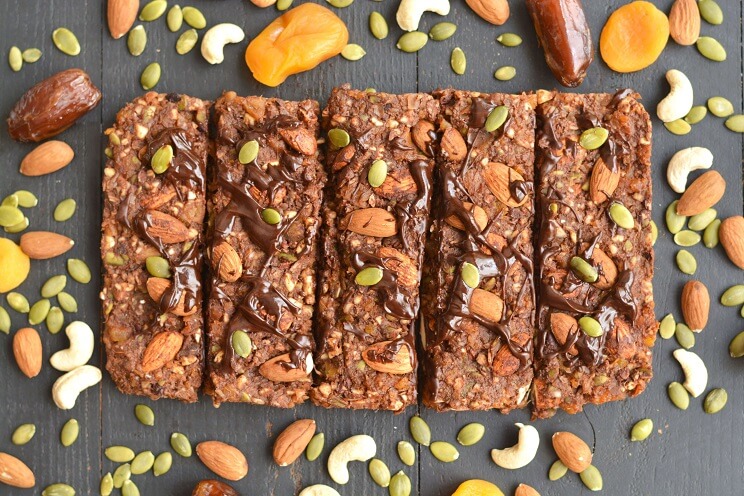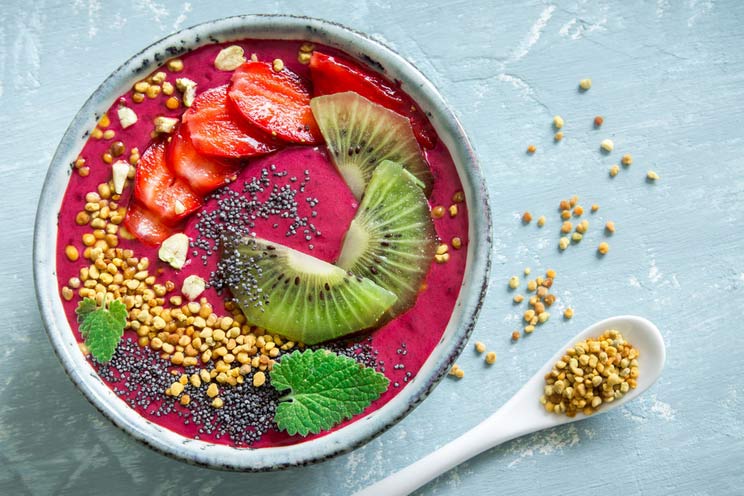Stress is a common side effect of modern life, and also a difficult thing to regulate by willpower alone.
Aside from it having an obvious negative effect on our mood, research has also shown it can suppress our immune system, possibly making us more susceptible to infections.
Here we dive into why this occurs, as well as the specific foods, herbs, and nutrients we can consume and techniques we can practice to ease stress.
Want to train your brain to be happier and healthier?
Click here to receive our FREE 7-Day Meditation Challenge!
Stress and Immunity: The Link
To understand the effect stress has on your immune system, it helps to have a basic overview of just how immunity works.
Your immune system is composed of billions of tiny cells that circulate through your body, acting as the first line of defense against invading pathogens like bacteria, viruses, and other toxins. These include natural killer T cells and cells called phagocytes and lymphocytes, which are alerted when a foreign pathogen enters your body.
These cells then attack and destroy the pathogen, while also storing critical information about the bacteria or virus to “remember” if it encounters it again. Antibodies are then produced so that your body can easily recognize and get rid of the same pathogen next time.
Stress can create a hitch in this process. Studies show it can almost immediately reduce the effectiveness of killer T cells and suppress lymphocytes, which can lower your defenses against pathogens. One found that participants with chronic mild depression had weaker lymphocyte-T cell responses and that their immune response was down even 18 months later. (1)
Other research has found that some immune cells have receptors for certain hormones released during stress. This means that when those hormones are released, immune function can be altered when those hormones are received by immune cells. (2) Cortisol, one of the hormones released during stress, can cause your immune system to release inflammatory cytokines. While this is beneficial in the short term, if stress becomes chronic, this can lead to dysregulation of your immune system and an increased risk of chronic diseases. (3)
Top 10 Herbs and Nutrients That Help Reduce Stress

While letting go of stress seems like a simple concept on the surface, it can often be difficult to totally get rid of, especially when that stress comes from a job we have to manage daily or family life.
Luckily, certain foods, nutrients, and herbs can help calm our nervous system and improve our physical and emotional response to stress so that it has a less detrimental effect on our immune system.
1. Rhodiola Rosea
Rhodiola is a root hailing from the northern mountainous regions of Europe and Asia. It is classified as an adaptogen, which is a class of herbs that help your body “adapt” more effectively to stress. In essence, it strengthens your body’s resilience to stress, which can lessen its negative effects. It also helps regulate the release of stress hormones and has been known to increase energy levels during stressful situations. (4)
You can take Rhodiola as a capsule or in powder form.
2. Lavender
Lavender is one of the most well-known herbs to help reduce stress, and for good reason. Studies show it acts as a mild sedative and antidepressant, whether consumed orally or used in aromatherapy. (5)
Drink lavender as a tea or diffuse the oil in an essential oil diffuser and inhale deeply as needed.
For more essential oils that help with anxiety, read The 10 Best Essential Oils for Anxiety.
3. Magnesium
Studies on magnesium show that it may help with brain function that reduces stress and anxiety, along with helping to regulate the neurotransmitters involved in stress. (6)
Try to incorporate more magnesium-rich foods, such as leafy greens, nuts, dark chocolate, seeds, and plenty of root veggies like sweet potatoes. You can also supplement with magnesium powders or capsules. Keep in mind that the most absorbable forms include: magnesium citrate, magnesium lactate, magnesium aspartate, magnesium chloride, magnesium malate, and magnesium taurate.
You might also be interested in The Benefits of Magnesium Oil (Plus: DIY Spray Recipe).
4. Passionflower
Passionflower has the ability to help boost gamma-aminobutyric acid (GABA), a natural amino acid that works as a neurotransmitter in your brain. GABA can help reduce excitability in your nervous system, which can be caused by stress and anxiety. Studies also show it can almost immediately help increase relaxation. (7)
Passionflower can be taken as a tea or in capsule form.
5. Valerian Root
Valerian root is an herb similar to passionflower, with similar effects. Studies show it can help reduce psychological anxiety, and can also help boost GABA levels in your brain. (8, 9)
Valerian root can also be taken as a tincture or in capsule form.
6. L-Theanine
L-theanine is an amino acid commonly found in green tea that can help reduce cortisol levels, the hormone released during stress, as well as increase GABA and other relaxation-promoting neurotransmitters like serotonin. (10, 11)
As mentioned, green tea (especially matcha) is a great source of L-theanine, as well as yerba mate tea, and to a lesser extent, coffee.
Try these Matcha Brownies with Green Tea Frosting.
Foods That Help Fight Stress

Specific foods have been studied for their overall ability to ease stress; you’ll notice that some include a combination of the nutrients above.
1. Dark Chocolate
Aside from the comfort factor of chocolate, studies show that participants who ate 74% dark chocolate twice a day for two weeks experienced improved levels of stress hormones (such as cortisol and catecholamines) commonly associated with anxiety. (12)
Be sure to choose dark chocolate containing at least 75% cacao. For more on cacao, read 12 Amazing Benefits of Raw Cacao (& Delicious Ways to Eat It).
2. Wild Fish
Wild fish like salmon and sardines contain high levels of omega-3s and vitamin D, both of which have been shown to improve symptoms of anxiety. (13) Research also shows DHA, one of the components of omega-3s, can help reduce psychological stress. (14)
Try to consume wild fish like salmon, sardines, and mackerel 3 to 4 times a week.
3. Berries
During stress, our immune system can increase widespread inflammation throughout our bodies. If this goes on for too long, it can damage tissues and DNA. The antioxidants in blueberries can help reduce inflammation and protect DNA, reducing the damage to your body during stress. (15)
Try to consume a handful of blueberries or blackberries daily, or at least several times a week.
4. Bananas
Bananas are rich in an amino acid called tryptophan, the main precursor to serotonin, a neurotransmitter involved in enhancing relaxation and improving mood. (16)
Try grabbing a banana as a snack a few times a week, or when you’re feeling stressed.
5. Probiotic Foods
Studies show that probiotics, or good bacteria found throughout our body, can help reduce anxiety levels. One study found that participants, who struggled with anxiety, were more able to handle their stress when they ate probiotic yogurt every day compared to those who ate yogurt without probiotics. (17, 18)
Consume plenty of probiotic-rich foods like sauerkraut, kimchi, and non-dairy yogurts.
Make your own dairy-free yogurt! How to Make Dairy-Free Coconut Yogurt.
Other Practices to Soothe Your Nervous System

Aside from food, there are several other proven practices you can do daily that can have a direct effect on reducing stress. These include:
Diaphragmatic Breathing
Diaphragmatic breathing, or belly breathing, is the practice of breathing deep into your belly. Typically, we tend to breathe shallowly into our chest, especially when stressed. Shallow breathing activates the sympathetic nervous system responsible for your fight-or-flight response, while deep breathing activates your parasympathetic response, responsible for relaxation.
Studies show belly breathing can reduce cortisol (the stress hormone) levels, while also improving mental function. (19)
To practice belly breathing, lie flat on your back. Place one hand on your belly and breath deeply. Your belly should push your hand up. Now, exhale completely, pushing all of the air out. Repeat for 5-15 minutes daily.
Try these 5 Breathing Exercises to Boost Focus, Energy & Relaxation (In 5 Minutes or Less).
Mindset Shift
One of the quickest ways to find peace in stressful situations is to shift the way we think about it. For instance, we can shift our thought process from, “My job sucks”, to “This job is showing me what I really dislike in a work environment”. This information can then help us make a more informed job decision in the future if we choose to use it this way. Finding the way a situation may be working for your benefit (even if that benefit is small and in the future) may help ease some anxiety in the present.
Yoga
Studies show practicing yoga can help reduce cortisol levels similar to belly breathing and other forms of exercise. (20) Practicing for even 15 minutes a few times a week is enough to see a benefit.
A good place to start is The 5 Best Yoga Poses to De-Stress.
The Bottom Line
Stress can have a huge impact on your immune system’s ability to function efficiently. Supporting it with herbs, nutrients, foods, and other techniques like proper breathing can go a long way in strengthening your immune system against the effects of stress.
Read This Next: Elderberry Benefits for Viruses, Colds, Allergies, and the Flu



 Elderberry Benefits for Viruses, Colds, Allergies, and the Flu
Elderberry Benefits for Viruses, Colds, Allergies, and the Flu









Show Comments